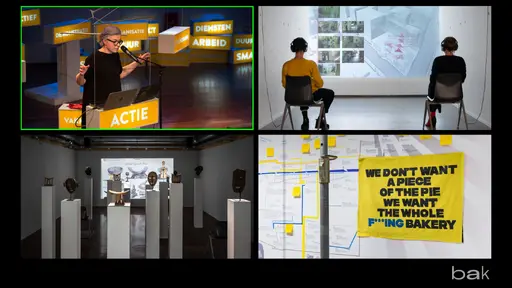
22 March 2022
Course: Art as Politics – For Ukraine
BAK, basis voor actuele kunst, organizes this edition of the course Art as Politics in solidarity with the Ukrainian people. All proceeds of this fundraiser are to be donated to the Visual Culture Research Center, who are providing structural help to cultural workers affected by the war.
BAK organizes this edition of the course Art as Politics in solidarity with the Ukrainian people. All proceeds of this fundraiser are to be donated to the Visual Culture Research Center, who are providing structural help to cultural workers affected by the war.
Art as Politics, a digital extension of BAK Studies (formerly called BAK Public Studies), is prompted by the urgency to engage in collective thinking through, learning about, and imagining critical, politically-informed artistic practices that grasp—and intervene into—the present. The course brings those involved and/or interested in art, theory, and social action into collective conversation with a focus on the changing nature of artistic practices in the face of multiple and entwined crises, critical redefinitions of “publics,” institutional structuring, and art as envisioning and actualizing politics of “being together otherwise.”
The sessions take place on the following Tuesdays and Thursdays, 18.30-21.00 hrs CET, via Zoom: 22, 24, 29, and 31 March, and 5 April 2022.
Art as Politics, a digital extension of BAK Studies (formerly called BAK Public Studies), is prompted by the urgency to engage in collective thinking through, learning about, and imagining critical, politically-informed artistic practices that grasp—and intervene into—the present. The course brings those involved and/or interested in art, theory, and social action into collective conversation with a focus on the changing nature of artistic practices in the face of multiple and entwined crises, critical redefinitions of “publics,” institutional structuring, and art as envisioning and actualizing politics of “being together otherwise.”
The sessions take place on the following Tuesdays and Thursdays, 18.30-21.00 hrs CET, via Zoom: 22, 24, 29, and 31 March, and 5 April 2022.
Five sessions
Over five sessions, the participants engage in an in-depth analysis of concrete works of art and projects from within the BAK archive of practice, focusing on the historical period starting with the pivotal year 1989. The case studies and examples of artworks are mainly from BAK’s international projects Propositions for Non-Fascist Living (2017–ongoing), FORMER WEST (2008–2016), and Future Vocabularies (2013–2016), and include works by artists such as Kader Attia, Forensic Architecture, Jeanne van Heeswijk, Aernout Mik, Rabih Mroué, and Jonas Staal, among others.
The course takes a broad view on artistic production, institutions, and publics, and attempts to build a critical vocabulary through which to reshape understanding and practice of art in the face of present global challenges. The course is taught by Maria Hlavajova, BAK’s general and artistic director.
Session 1: In This Time of Crisis: How do Art and Politics Meet?
Session 2: Future Publics
Session 3: Once We Were Artists
Session 4: Rethinking/Reworking Institutions
Session 5: What is Political Imaginary?
The course takes a broad view on artistic production, institutions, and publics, and attempts to build a critical vocabulary through which to reshape understanding and practice of art in the face of present global challenges. The course is taught by Maria Hlavajova, BAK’s general and artistic director.
Session 1: In This Time of Crisis: How do Art and Politics Meet?
Session 2: Future Publics
Session 3: Once We Were Artists
Session 4: Rethinking/Reworking Institutions
Session 5: What is Political Imaginary?
BAK Studies
BAK Studies (formerly called BAK Public Studies) offer critical insights into theoretical foundations and concrete actualizations of art as public practice. Understanding art in relation to both theory and social action, BAK Studies form a space for collective thinking, imagining, and acting in parallel to BAK’s politically-driven and theoretically-informed research, discourse, exhibitions, and publications.
* Credits image, l.–r. (all photographs taken at BAK, basis voor actuele kunst, Utrecht by Tom Janssen):
– Maria Hlavajova speaks during Propositions #10: Instituting Otherwise, 7 December 2019
– Forensic Architecture, M2 Hospital Bombing, 2017, installation view exhibition Forensic Justice
– Kader Attia, Les Entrelacs de l’Objet / The Object’s Interlacing, 2020, installation with video and objects, 2021, BAK, basis voor actuele kunst, Utrecht, photo: Tom Janssen
– Homebaked Community Land Trust (CLT), Homebaked Co-operative Bakery, and Homegrown Collective in collaboration with Britt Jürgensen, URBED, and Jeanne van Heeswijk, Brick by Brick and Loaf by Loaf We Build Ourselves, 2019, installation view Trainings for the Not-Yet
* Credits image, l.–r. (all photographs taken at BAK, basis voor actuele kunst, Utrecht by Tom Janssen):
– Maria Hlavajova speaks during Propositions #10: Instituting Otherwise, 7 December 2019
– Forensic Architecture, M2 Hospital Bombing, 2017, installation view exhibition Forensic Justice
– Kader Attia, Les Entrelacs de l’Objet / The Object’s Interlacing, 2020, installation with video and objects, 2021, BAK, basis voor actuele kunst, Utrecht, photo: Tom Janssen
– Homebaked Community Land Trust (CLT), Homebaked Co-operative Bakery, and Homegrown Collective in collaboration with Britt Jürgensen, URBED, and Jeanne van Heeswijk, Brick by Brick and Loaf by Loaf We Build Ourselves, 2019, installation view Trainings for the Not-Yet